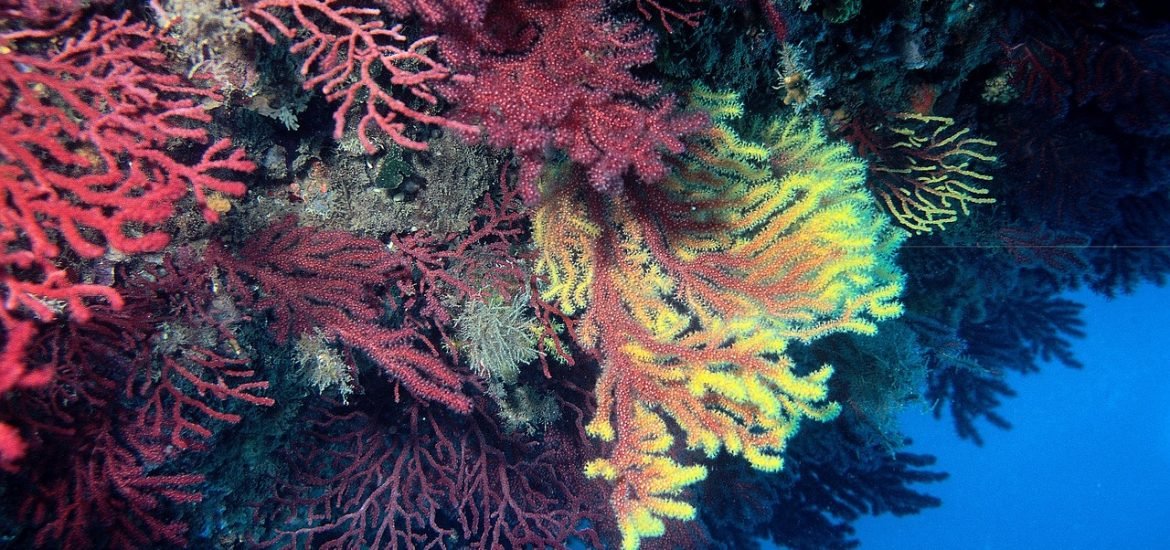
Red gorgonians are losing their ability to resist and recover from heatwaves, according to a study published in the Journal of Animal Ecology.
A team of researchers from the University of Barcelona, Spain, analysed how red gorgonians (Paramuricea clavata), a critical species of coral in the Mediterranean marine ecosystem, can resist and recover from heatwaves. The results show that the increased frequency of extreme weather conditions caused by climate change makes these populations more vulnerable and struggling to cope. The authors warn that this may raise its risk of extinction.
“Paramuricea clavata is a species that plays an essential role in a type of community endemic to the Mediterranean Sea, the coralligenous. These communities have a high associated diversity and represent approximately 10% of Mediterranean species. Therefore, a decrease in the resilience of these species, or even their extinction, can lead to major changes in the structure and functioning of the Mediterranean seabed”, warned Professor Pol Capdevila, from the Faculty of Biology and researcher at the UB’s Biodiversity Research Institute (IRBio).
Between 1999 and 2022, the team monitored nine populations of red gorgonians in the Montgrí, Medes Islands, and Baix Ter Natural Park and in the Port-Cros Natural Park. The aim was to determine how resilient these organisms are to marine heatwaves. “The Mediterranean Sea has warmed faster than the global oceans, making it one of the regions most affected by marine heatwaves, events that are expected to increase in frequency, intensity, duration, and extent, even under the most optimistic climate change scenarios. Understanding the resilience of marine species to the increase in these extreme events is therefore crucial for predicting their viability under future climate conditions”, noted the authors of the paper.
The study shows that P. clavata exposed to heatwaves have lower resilience and slower recovery rates than populations not exposed to these events. “These results suggest that increased heatwave frequency is likely to accelerate the extinction of shallower populations of P. clavata. And not only that: what we have observed is that, after suffering a heatwave, these populations are less able to resist and recover from other types of disturbances”, Capdevila remarked.
According to the authors, this is likely to occur in other Mediterranean locations and coral species, although more research is needed. Paramuricea clavata is very dependent on the survival of adult individuals, which is not necessarily the case for other species. As such, these results are not necessarily extrapolable to coral species with faster population dynamics.
Curiously, these results contradict the ecological memory hypothesis, where the influence of past events can help with current events. This idea is based on studies conducted on the Great Barrier Reef, where corals coped better with heatwaves if they had been exposed to one previously. “In the context of the Great Barrier Reef, the ecological memory hypothesis predicts that populations that have survived previous waves of disturbance may be less affected by new heatwaves. However, our results indicate that, with more heat waves, the resilience of these species to further disturbances is lower”, said Pol Capdevila.
Given these results, the experts warn that we should protect the red gorgonian populations. “For example, at the local level, populations of this species could be protected through marine protected areas or by restricting recreational activities, such as diving, where these corals are found. On the other hand, on a larger scale, measures to minimize climate change should be implemented more effectively, as it would benefit not only this species but many others”, they concluded.
Capdevila P, Zentner Y, Rovira G, Garrabou J, Medrano A, Linares C. Mediterranean octocoral populations exposed to marine heatwaves are less resilient to disturbances. J Anim Ecol. 2024 Sep 14. doi: 10.1111/1365-2656.14147. Epub ahead of print. PMID: 39277786.